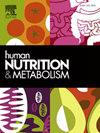杏鲍菇全基质、消化产物和富含β-葡聚糖的提取物体外发酵对健康老年人粪便微生物群有显著影响
IF 1.8
Q3 ENDOCRINOLOGY & METABOLISM
引用次数: 0
摘要
杏鲍菇(Pleurotus eryngii, PE)是一种富含生物活性化合物的食用菌,具有免疫调节、抗炎、抗氧化、抗癌、抗微生物、抗肝毒和降血脂的作用,对老年人的健康都很重要。本研究在体外评估了多种形式的这种蘑菇的益生元样作用。用5名明显健康的老年人粪便接种菌进行体外静态分批发酵24小时,发酵条件为:全食物基质(PEWS)、体外消化(PEWSD)和富含β-葡聚糖提取物(PEWSE)。通过16S rRNA Next Generation Sequencing和real-time Quantitative PCR检测发酵过程中科、属、种水平细菌群落的变化。短链脂肪酸(SCFAs)采用气相色谱(GC)定量,其他代谢物采用超高压液相色谱-串联质谱(UHPLC-MS/MS)分析。DEseq2分析表明,与阴性(非碳源)和阳性(菊粉)对照相比,PEWS的存在对粪便微生物家族和属丰度的影响最大。只有PEWS显著增加了双歧杆菌和prausnitzii双歧杆菌的数量,而这三种形式都显著增加了拟杆菌和丁酸、乙酸和丙酸的数量。p <;0.05. 总的来说,研究结果强调了PE对老年人肠道健康的有益作用,支持将其纳入创新功能食品的潜力。然而,在将这些发现转化为饮食指南或临床应用之前,还需要更多的体内研究来证实这些发现。本文章由计算机程序翻译,如有差异,请以英文原文为准。
In vitro fermentation of whole matrix, digested products and β-glucan enriched extract of Pleurotus eryngii mushrooms distinctively impact the fecal microbiota of healthy older adults
Pleurotus eryngii (PE), an edible mushroom rich in bioactive compounds, has been shown to exert immunomodulatory, anti-inflammatory, antioxidant, anti-carcinogenic, anti-microbial, antihepatotoxic and hypolipidemic activities, all important for the well-being of the ageing population. This study assessed in vitro the prebiotic-like effects of multiple forms of this mushroom. An in vitro static batch fermentation was performed for 24 h with faecal inocula from five apparently healthy older adults in the presence of the following PE forms: whole food matrix (PEWS), in vitro digested (PEWSD) and rich in β-glucans extract (PEWSE). The changes in bacterial communities upon fermentation at family, genera and species level were detected via 16S rRNA Next Generation Sequencing and Quantitative real-time PCR. Short-chain fatty acids (SCFAs) were quantified using gas chromatography (GC), whereas other metabolites were analysed through ultra-high pressure liquid chromatography-tandem mass spectrometry (UHPLC-MS/MS). DEseq2 analysis indicated that PEWS presence exhibited the largest impact on faecal microbial families' and genera's abundance compared to negative (non-carbon source) and positive (inulin) controls. Only PEWS significantly increased Bifidobacterium spp. and F. prausnitzii populations, while all three forms robustly increased Bacteroides spp. levels and levels of butyrate, acetate and propionate acids. Statistical significance was set at p < 0.05. Overall, the findings highlight the beneficial effect of PE on intestinal health of older adults supporting its potential incorporation into innovative functional foods. However, additional in vivo studies are required to substantiate these findings before translating them into dietary guidelines or clinical applications.
求助全文
通过发布文献求助,成功后即可免费获取论文全文。
去求助
来源期刊

Human Nutrition and Metabolism
Agricultural and Biological Sciences-Food Science
CiteScore
1.50
自引率
0.00%
发文量
30
审稿时长
188 days
 求助内容:
求助内容: 应助结果提醒方式:
应助结果提醒方式:


